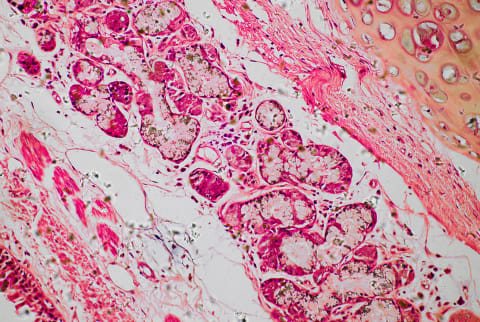Advertisement
Why Microbiome Health Is More Important Than Ever (And How To Get Yours Back On Track)


The amazing and multifaceted creatures that live in, on, and around us have a huge effect on how we feel, how we think, and how our entire body functions. And as we learn more and more about the body's various microbiomes (like the one in the eyes, on the skin, and in the vagina) and the multitude of functions they perform to support our health, it's becoming clear that they are fundamental to our ability to live healthy lives. In fact, they are symbiotically connected to us and we to them. The trillions of bacteria, fungi, and viruses that reside in and on us are definitely not something we should ignore.
Our relationship with our microbiome has evolved for millennia.
We can't ignore the depth of our relationship with the microbes residing in our bodies. They're a crucial part of human evolution, and they care for us in ways we never could have imagined, even just a few years ago. Unfortunately, because of our lack of knowledge about the intricate relationship we have with these microbes, we have been inadvertently neglecting them for years. But we can no longer afford the luxury of ignorance! As a doctor, it's my responsibility to take the time to educate my patients on the existence and importance of our microbiomes and also take the time to fully understand how they work and influence my patients' health.
The microbiome is one of the most complex biological systems on earth.
The microbiome is the total genetic collective of all the microorganisms that have colonized the body. This includes bacteria, viruses, and fungi and yeast, which all work together in our bodies to creating a complex ecosystem. And like any system, if you start to damage any one part‚ everything suffers. The largest and most complex of our microbiomes is that of the gut, and disruptions in its delicate balance have been linked to virtually every disease that a person can suffer, from autism to cancer to dementia to cardiovascular and autoimmune diseases. In just one example, short-chain fatty acids—the metabolic by-products of the fermentation of fiber that are produced by the gut microbes—are important for numerous aspects of health, including the maintenance of optimal metabolic well-being, mood, and cognition, and the health of the immune system.
Our modern lives threaten our microbiome health in more ways than one.
Until 25 years ago, we knew nothing at all about the microbiome, and as a result, we have been accidentally killing off the beneficial microbes left and right. What are the biggest threats to our microbiome health? For starters, chemicals in our water, pesticides in our food, and antibiotic drugs aren't friendly to our microbes. Mouthwashes and many toothpastes can disrupt the mouth microbiome, and many skin creams, antimicrobial soaps, disinfectants, and even sunblocks can do the skin microbiome harm. Certain eyedrops can affect the eye microbiome, and our natural vaginal microbiomes can be disrupted through the use of sexual lubricants, therapeutic treatments, non-organic tampons, and different contraceptives like IUDs and spermicides.
Getting you microbiome back on track is a process—but it is possible.
Clearly, our microbiomes are crucial to our well-being, and they are also constantly under attack from our modern lifestyles. In integrative and functional medicine, balancing the microbiome and healing the gut is done in a five-step process, affectionately called the "5 Rs."
1. Remove
First, it's harmful foods and chemicals from the diet. This means common food allergens like corn, wheat, dairy, and all processed foods.
2. Replace
Now, replace those harmful foods and chemicals with things your gut needs to be happy. This includes things like digestive enzymes, hydrochloric acid (stomach acid) and bile acids that are required for proper digestion.
3. Repair
The third step is to repair the microbiome through the application of nutrients and coating agents (known as demulcents), including ingredients like L-glutamine, marshmallow root, slippery elm, aloe vera, fiber, vitamins, and minerals.
4. Repopulate
Then, repopulate the gut with supplemental probiotics and fermented foods like kimchi, sauerkraut, and yogurt.
5. Restore
Even though you're working to heal your gut, it's important to remember that the whole body is connected. That's why the last and final step is to restore the spirit by addressing emotional issues, mood problems, and stress.
Like it or not: We're connected to our microbes forever.
The microbiomes of the human body are vast, complex, and essential to our welfare. We humans are "super organisms," the composite of the genomic material of our cells and that of our inhabiting microbes. It's definitely time that all conventional doctors considered the health of our friendly microbial inhabitants as much as the health of our own genetically produced cells. We are a team: We are one being made of trillions of aliens who have come to be incorporated into our very essences. We must recognize them and nurture them, and in return we will have the gift of health and vitality.
Want to know more about probiotics? Here's a good place to start.